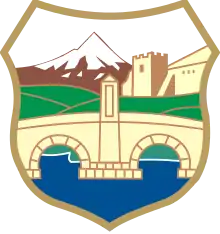Nova International Schools
Nova International Schools is an independent, college preparatory, co-educational day school that offers an educational program from pre-kindergarten (2.5 year old) through grade 12. The school was founded in 1997 and the campus is spaciously situated in a residential neighborhood near the city center. The school year is divided into 2 semesters and extends from late-August to mid-June. During the year students have a 1-week fall break (October), a 3-week winter break, a shorter (February) break, and a 1-week spring break (April).
| Nova International Schools | |
|---|---|
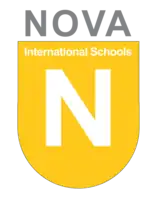 | |
| Address | |
Prashka 27 1000 Skopje North Macedonia | |
| Information | |
| Motto | Seek self and others, in heart and mind, unafraid of the possibilities. |
| Established | 1997 |
| Website | www |
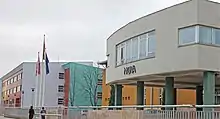
The school is divided into 3 divisions: Early Education Center - EEC (PK3, PK4 and Kindergarten), Elementary and Middle School - EMS (grades 1-8), and High School - HS (grades 9-12).
3-year-old and 4-year-old prekindergarten groups use play based learning. The Elementary and Middle School use the U.S. Common Core Standards for literacy and numeracy, and the International Early Years, Primary, and Middle Years Curriculum (IEYC, IPC and IMYC) for inquiry based learning. Specialty classes are included for students in grades PK-8, and elective classes are offered in the Middle and High school. The High School offers the IB Diploma Program (IBDP), and several Advanced Placement courses.
The instructional language of the school is English. The school uses Measures of Academic Progress (MAP), the PSAT and SAT to benchmark academic achievement and growth. Languages are offered in grades 1-5 as an after school program, and in grades 6-12 as electives, and they include French, German, Italian, Spanish, Mandarin, Albanian and Macedonian. The Center for Differentiated Learning (CDL) offers support for classroom integration of children with IEPs, and pull out interventions that are tailored to their specific needs.
Early Education Center
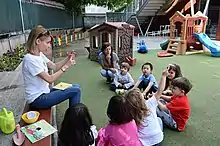
Youngest learners grow and make meaning through the International Early Years Curriculum (IEYC). This internationally recognised curriculum was developed with global best practices and the developmental needs of 2- to 6-year-olds in mind. It supports key areas of learning through holistic enquiry and play-based approaches.
Elementary School
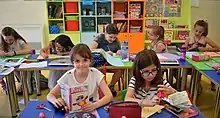
NOVA Elementary School uses the framework of the US Common Core standards for English and Math, and the International Primary Curriculum for Science, History, Geography, and Creative Arts. Mathematics is taught using the Math in Focus program and literacy is taught through the Reader's and Writer's workshop model. Cross-curricular, thematic units are carefully planned, with homeroom and specialty teachers working together to ensure deeper learning for all our students.
Middle School
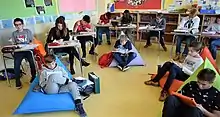
Nova's Middle School students prepare for the demands of high school using the structure of the International Middle Years Curriculum (IMYC) and Common Core Standards. Students are expected to master English and mathematics objectives set forth by the Common Core Standards for each grade level. For subjects such as History, Geography, Art, and Physical Education, objectives were formulated by the creators of the IMYC. Students are evaluated as “Beginning,” “Developing,” or “Mastering” for each objective. The use of standards ensures a steady progression of knowledge and skills throughout the middle school years.
High School
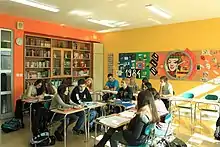
Nova's High School curriculum is based on the Common Core Standards, and also offers the International Baccalaureate Diploma Program (IBDP), the Advanced Placement (AP) Program, and traditional core programs alongside electives. Upon graduation, each student is awarded a NOVA Diploma. In addition, IBDP students are awarded an IB Diploma, following a successful completion of the program requirements. Qualifying AP students are awarded an Advanced Placement International Diploma.
Classes differentiate into four performance levels. MAP (Measures of Academic Progress) test results are considered for placing incoming students; PSAT and AP Potential results are also factored in. The levels include:
International Baccalaureate (IB)
Introduced in 2006, the Diploma Program IB courses at NOVA are part of an academically rigorous college bound IB Diploma Program (IBDP) for the internationally minded students.
Advanced Placement (AP)
Introduced in 2001, there are over 20 AP courses offered. AP courses are preparatory or university level courses that may earn student's college credit at North-American, Western European and Australian universities. As of the 2020/2021 academic school year, AP subjects are not being offered
Honors/Advanced (H/Adv)
Students scheduled at this level have demonstrated distinct aptitude and skill within this rigorous academic program. The curriculum includes the application of independent study and individual research work. Currently courses in the subject areas of English, Mathematics, PE, Art; Biology, Chemistry, Physics are offered at this level.
Regular (R)
The regular curriculum emphasizes mastery of academic skills relevant to an appropriate grade level and incorporates a variety of enrichment activities (field work). Over 60 courses are offered at this level, including those that have no Regular/Honors distinction (Social Sciences in years 9 and 10, Foreign Languages, Native Languages in years 9 and 10, Fine and Performing Arts, Information and Communication Technology, PE).
To graduate, students (except IBDP candidates) must earn 24 credits: English (4), Native Language (only for Macedonian citizens, 4, whose total load stands at 28), Foreign Language (2), Mathematics (3), Information and Communication Technology (1), Natural Sciences (3), Social Sciences and Humanities (3), Fine and Performing Arts (2), Physical Education (1.5), Electives (3), and other requirements (1.5). All courses are year-long, with the exception of Seasonal Sports (Fall and Spring, 9 weeks; Winter Season, 11). In addition, Grades 9/10 complete a 1.0 credit in the Interdisciplinary Writing Workshop (0.5 credit per year), while all non-IBDP Grades 12 are required to complete the Foundations in Research Course (0.5 credit, Pass or Fail, independent, mentor-guided research project and oral defense).
School day
Early Education Center and Elementary and Middle School
The school day begins promptly at 08:00 and ends at 15:10 from Monday to Friday, with an early release time of 14:20 each Wednesday. Students are expected to be in their classrooms and ready to start by 08:00 and may arrive from 07:45 onward. All classes are 50 minutes long which is an ideal time for productive teaching and learning. The day starts with 15 minutes of Drop Everything And Read (DEAR) Homeroom or Teacher Advisory Group. There are seven instructional periods a day, except for Wednesday when there are six.
Students receive instruction in Reading/LA, Math and International Primary Curriculum subjects on a daily basis. Art, Music, Physical Education and Dance are taught throughout the school year with two classes per week, and Macedonian Language classes take place three times per week throughout the school year. Computer Education is integrated with core classes as well as with specialty classes throughout the year. All students receive ESL support until they are proficient with the language. The support is conducted in the form of push-ins and pull-outs. Middle school students are offered a foreign language and an elective subject.
Students have a short breakfast snack. Lunch and recess is scheduled at different times for different school divisions. Our youngest students have another snack in the afternoon. Students are not allowed to leave the building during school hours. Parents/guardians are expected to pick up their child(ren) promptly at 15:10 unless they are in a supervised after school activity or enrolled in the daycare program.
High School
The School building is open to students between the hours of 8:00 a.m. and 4:00 pm daily. Access to the facilities outside of these times is permitted in the presence of a faculty or staff member, with prior administrative approval. The school day begins at 8:00 every day. Classes end by 15:20, with After School Activities being held from 15:20 until 17:00 on given days.
We know that there are pre-conditions for academic learning and therefore our schedule reflects a more balanced approach to learning. We have included a core period/allocation, intended to provide a more diverse and tailored experience for your child. Core time supplements both academic learning and will develop self-efficacy in our learners.
For Grades 9 and 10, the Core period is used for:
- Community Service (structured learning opportunities empowering our learners as members of a wider community);
- Pastoral-care and guidance-based classes, focused on nurturing connections by facilitating discussions relating to their academic futures.
For Grades 11 and 12, Core time is allocated to:
- Counseling 11 and 12 classes, where students work on strengthening their university applications; profile;
- Foundations in Research Course (non-IBDP students), addressing the key aspects to carrying out independent, mentor-guided research paper and project.
- Student-directed service learning time, allowing groups to meet and plan for individual project realization.
After school options
After school activities and clubs
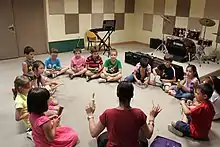
The school offers a varied program of After School Activities (ASA) throughout the school year. It covers a variety of sports, games and activities. Its purpose is to improve young people's motivation, increase self-esteem and confidence, develop new skills and ultimately help them become better learners. These are non-competitive activities offered to all NOVA students, intended to meet their interests and needs. After School Activities are supervised by teachers, teacher assistants and volunteer parents, and are great opportunities to meet new friends, learn new skills and explore and develop new talents. Activities offered include: academic writing, art, baseball, basketball, tennis, band, ballet, hip-hop, chess, choir, band, drama, martial arts, yoga, young engineers, karate, jumping clay, soccer.
Language Institute
NOVA as an international school believes that languages are an important part of our learning experience. By developing our mother tongue we develop our identity, and by acquiring other languages we understand different cultures and perspectives, and thus we become responsible global citizens. Such perspective aligns with our driving mission to develop independent, passionate learners who are true to themselves, and at the same time are accountable to others; they understand diversity in all its local and global contexts. In this regard, NOVA has developed the Language Institute (LI) which includes two programs of language learning: Mother-Tongue program and a World Language program. The languages that are currently offered as part of the LI program are: French, German, Mandarin, Italian, Russian, Beginning Macedonian and Spanish language and Albanian for native speakers.
SUPERNOVA Athletics and Activities
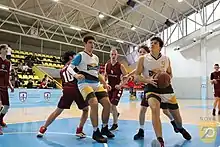
We believe that there is more to school life than classroom work. It is for this reason we are committed to offering a diverse and challenging SUPERNOVA athletic and academic activities program to our students with opportunities for enrichment, skill development, and personal growth beyond those available in the classroom. SUPERNOVA activities are offered to students in grades 5 through 12. As a full member of Central and Eastern European Schools Association (CEESA), NOVA sends SUPERNOVA teams to international CEESA tournaments and events, and hosts several of them throughout the school year. The activities that Nova students prepare for and participate in are international tournaments in soccer, basketball, volleyball, cross country, swimming, knowledge bowl, math, and robotics.
Learning support
Learning support is organized and provided as one-to-one tutoring and academic assistance, including homework support. Students in need of learning support are enrolled in this program following certain school procedures involving the students themselves, teachers and parents.
Day care
NOVA's day care program is designed to provide a fun and relaxing after-school supervision for students from Pre-Kindergarten through grade 5 to accommodate parents’ busy schedules and long working hours. These students cannot remain on campus after 15:15 unless they are enrolled in either an after school activity or day care. They can choose between either program, or do a combination of both.
Center for Differentiated Learning (CDL)
The Center for Differentiated Learning at Nova exists to enable every child to learn and reach their full potential. We understand that students learn differently and may need individual or small group instruction to meet these needs. The CDL provides a variety of programs that approach education in a multisensory way. The aim of each of these programs is to help every child experience success in the classroom, teaching learning strategies that lead to independent learners. The CDL works with students who have mild special learning needs. Its aim is to match a student's abilities and needs with a program that will help the child achieve his/her full potential.
School facilities
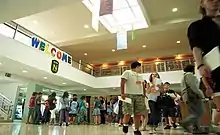
The school campus consists of dedicated early education, elementary and middle school, and high school buildings and ample outdoor spaces which include three gated playgrounds, a small soccer field, a basketball court, and a large outdoor amphitheater. The campus offers BYOD wireless connectivity. Our facilities include: five science labs, two art rooms, three computer labs, three libraries, three full-service cafeterias, two indoor amphitheaters, two music studios, two dance studios, a drama room, a fitness gym, and a photography lab.
The school uses an adjacent sports and recreational center for its physical education classes and for bigger events and competitions. The school also uses university science labs for advanced lab work.
Health, wellbeing and inclusion measures
At Nova, we have a registered nurse on duty each day, attending to primary health needs, sports and orthopedic injuries, emergency care and first aid; attending to health promotion through screenings and education, preparation for unexpected events, and monitoring of contagious illness for students travelling to school functions in other countries.
Organization
The school is advised by a nine-member School Board (two members are appointed by the US Ambassador);
Curriculum
The curriculum is similar to that of US college-preparatory PK-12 independent schools. Instruction is in English. It is delivered by The school offers the International Baccalaureate Diploma Program in grades 11 and 12. It also offers Advanced Placement (AP) courses, including the AP capstone diploma starting in September 2015. The school's testing program includes the Measures of Academic Progress (MAP), the PSAT and SAT, and the TOEFL. Foreign languages are offered in grades 6-12 and include: French, German, Italian, Spanish, Chinese, Albanian and Macedonian. Our Center for Differentiated Learning (CDL) offers support for classroom integration of children with mild to moderate learning needs. The School is home to Supernova athletics; grades 6-12 participate in all CEESA events and blue division sports. The majority of NOVA students matriculate to universities in the EU and the US.
School affiliations and accreditations
International accreditations and authorizations
● Middle States Association of Colleges and Schools (MSA-CESS) ● International Baccalaureate Organization (IBO) ● College Board (PSAT/SAT/Advanced Placement) ● International Early Years Curriculum IEYC ● International Primary Curriculum IPC ● International Middle Years Curriculum IMYC
Affiliations
● US Department of State Assisted Schools ● Northwest Evaluation Association (MAP) ● Central and Eastern European Schools Association (CEESA) ● WIDA International School Consortium (WIDA)
National accreditations
● Verification by the Ministry of Education of the Republic of North Macedonia, June 5th 1997, act# 11-128/7 ● Verification by the Ministry of Labor and Social Affairs of the Republic of North Macedonia, May 20th 2015, act# 11-2237/6 ● Approval by the Government of the Republic of North Macedonia, April 14th 1997, act# 23-3474/1-96
